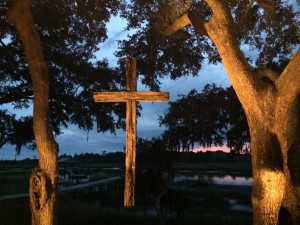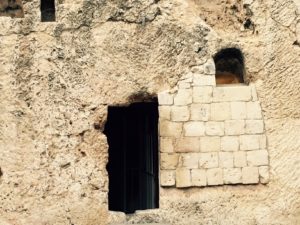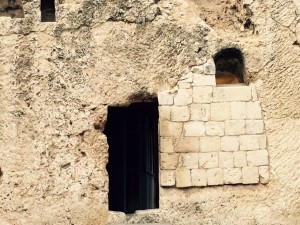It was before 9am that “Good Friday” morning when Jesus was brought to Pontius Pilate. Pilate’s wife knew Jesus was innocent.
“‘What is truth?’ Pilate asked. With this he went out again to the Jews and said, ‘I find no basis for a charge against him. But it is your custom for me to release to you one prisoner at the time of the Passover. Do you want me to release the king of the Jews?’ They shouted back, ‘No, not him! Give us Barabbas!’ Now Barabbas had taken part in a rebellion.” –John 18:38-40 NIV
Pilate’s three-word question of “What is truth?” is a question I find myself asking over and over. As we experience the different issues in our country, much of the outcomes are based on opinion versus Truth. We are living today what Jesus did then. And Jesus is “the way, the Truth, and the Life.” John 14:6.
Pilate thought Jesus would go free. Guess what Barabbas means in Aramaic? “Son of Abba.” Barabbas means “Son of the Father.”
Friend, each of us is a son (or daughter) of the Father. That means all of us. We are Barabbas. Like Barabbas, Jesus was our substitute. He died for you. He died for me.

Sadly, some of the same people who waved palms of the crowd singing “Hosanna!” were the same peer pressured crowd who cried “Crucify!” on Good Friday morning, resulting in the pierced palms of Jesus’ hands. May we not be as fickle in how we treat people.
Pilate then handed the badly beaten and scourged Jesus over to be crucified. Jesus began the agonizing climb to Calvary or Golgotha, the Place of the Skull.
“Here they crucified him, and with him two others–one on each side and Jesus in the middle. Pilate had a notice prepared and fastened to the cross. It read: ‘JESUS OF NAZARETH, THE KING OF THE JEWS…’ (John 19:18-19 NIV).
The criminal on one side of Jesus threw insults at Him asking if He were Christ, why didn’t He save Himself and them? The other criminal feared God and rebuked the other criminal, saying Jesus had not done anything wrong. The criminal humbly said,
“Jesus, remember me when you come into Your Kingdom.’ Jesus answered him, ‘I tell you the truth, today you will be with Me in paradise. ‘ “ (Luke 23:42-43 NIV).
As the excellent Leader Jesus is with profound discernment, He appreciated the thief’s humility and extended amazing, matchless grace and love to the thief. He gave Him the gift of eternal life, moments before they both breathed their last breaths on this earth.
Like the two thieves, one on each side of Jesus, we are given a choice. Perhaps that’s why there were two criminals being crucified beside Him– not one, not five, but two–because of THE choice.
To accept Jesus as our King of King and Lord of Lords or not.
To ask Jesus to remember you in His Kingdom or not.
To hurl insults at Jesus or honor Jesus with humble praises.
Have you humbly asked for Jesus to remember you as His and to join Him in the paradise of eternal life? Friend, if not, there’s a simple prayer at the bottom to pray and make the most important decision of your life.
“…Jesus said, ‘It is finished.’ With that, He bowed his head and gave up His spirit.” –John 30b NIV
The Greek word “Tetelestai” means “It is finished.” During New Testament times the word “Tetelestai” would have been stamped or written on business documents or receipts to indicate that a bill had been “Paid in Full.” The connection between this common business transaction stamp and the Ultimate Transaction Jesus accomplished on the cross was conveyed crystal clear in the Gospel of John with Jesus’ words.
Sweet friend, you are so loved. Jesus extended tremendous grace and love to us all. He paid a sin debt He did not owe because we owed a sin debt we could not pay.
Friday’s here, but Sunday’s comin’! Happy Resurrection Day!
Recharge:
If you would like to welcome Jesus as the King of your life, pray with me this simple prayer:
Dear God, I need You. I am humbly calling out to You. I’m tired of doing things my own way.
Help me to start doing things Your way. I invite You into my life to be my Lord and my Savior.
Fill the emptiness in me with your Holy Spirit and make me whole.
Lord, help me to trust You. Help me to love You.
Help me to live for You. Help me to understand Your grace, mercy and peace.
Thank You, Lord. In Jesus’ Name I pray. Amen.
Congratulations! Send me an email to danya.jordan777@gmail.com, and I’ll send you a free devotional book to encourage you in your new faith journey! 🙂
Reflect:
–What influence does a crowd make on decisions? Is the majority always right?
–Ask the question “What is truth?” daily. Remember that Jesus is the Truth and His Word is Truth.
–How are we like Barabbas?
–Which crucified criminal beside Jesus do you relate to?
–How have you received Jesus’ amazing grace and love recently?
Renew:
–Please read Psalm 22 and compare it to the Gospels of Matthew, Mark, Luke and John story of Jesus death and resurrection.
–“All the ends of the earth will remember and turn to the Lord, and all the families of the nations will bow down before Him, for dominion belongs to the Lord and He rules over the nations…They will proclaim His righteousness to a people yet unborn–for He has done it.” –Psalm 22: 27, 28, 31 (written hundreds of years before Jesus’ birth, death, and resurrection).
–“But He was pierced for our transgressions, He was crushed for our iniquities; the punishment that brought us peace was upon Him, and by His wounds we are healed. We all, like sheep, have gone astray, each of us has turned to his own way; and the Lord has laid on him the iniquity of us all.” –Isaiah 53:5-6 (written 700+ years before Jesus’ birth, death, and resurrection).
–“For you know that it was not with perishable things such as silver or gold that you were redeemed from the empty way of life handed down to you from your forefathers, but with the precious blood of Christ, a Lamb without blemish or defect.” –1 Peter 1:18-19










 Danya Jordan
Danya Jordan